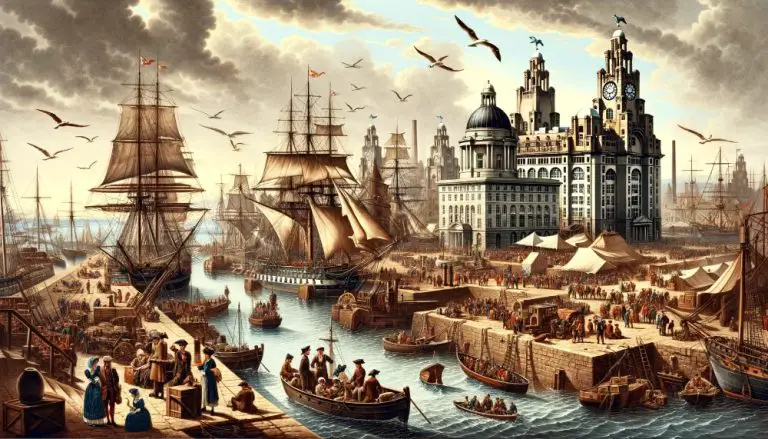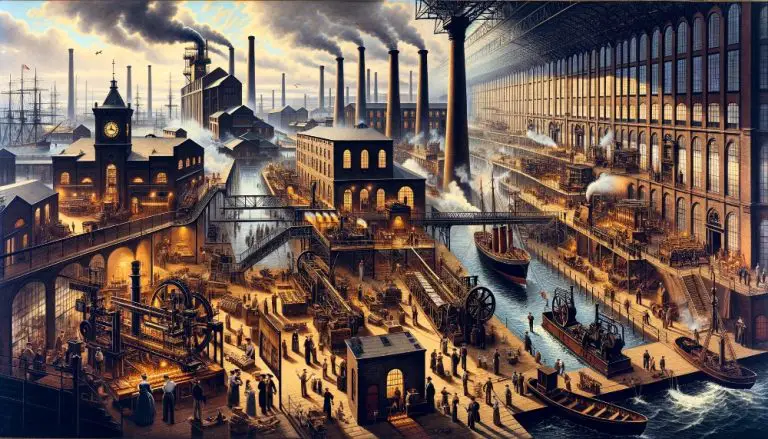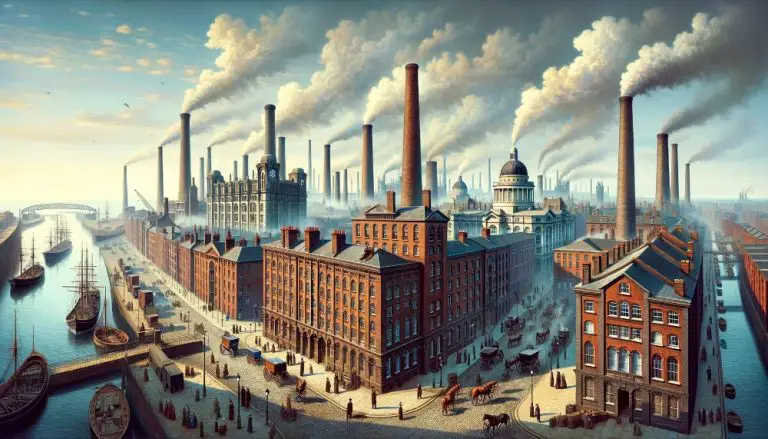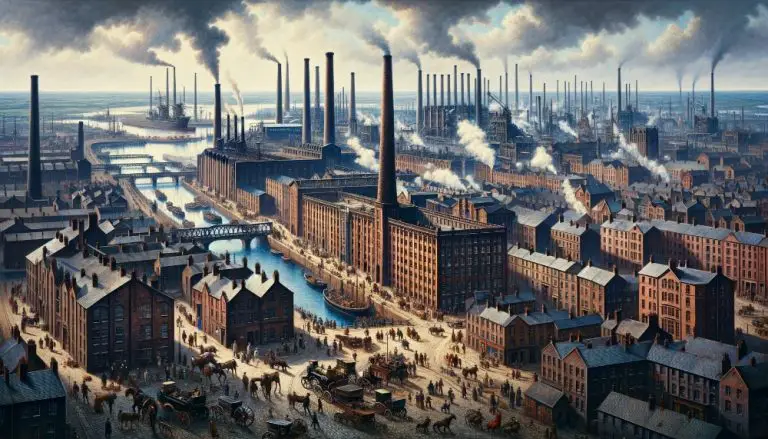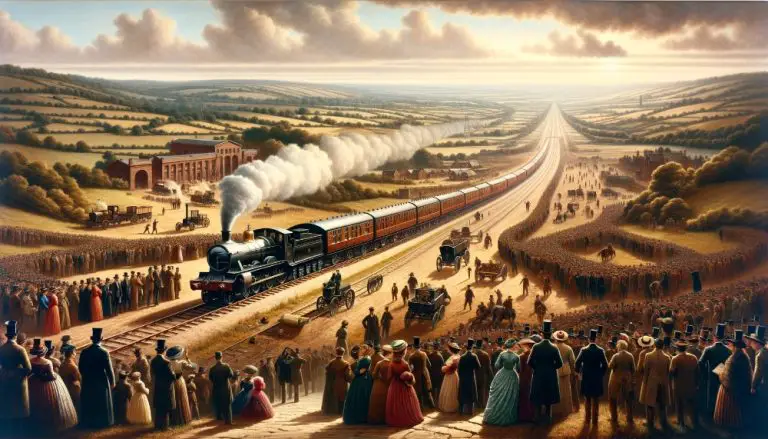Labour Movements and Social Reform in Liverpool During the Industrial Revolution
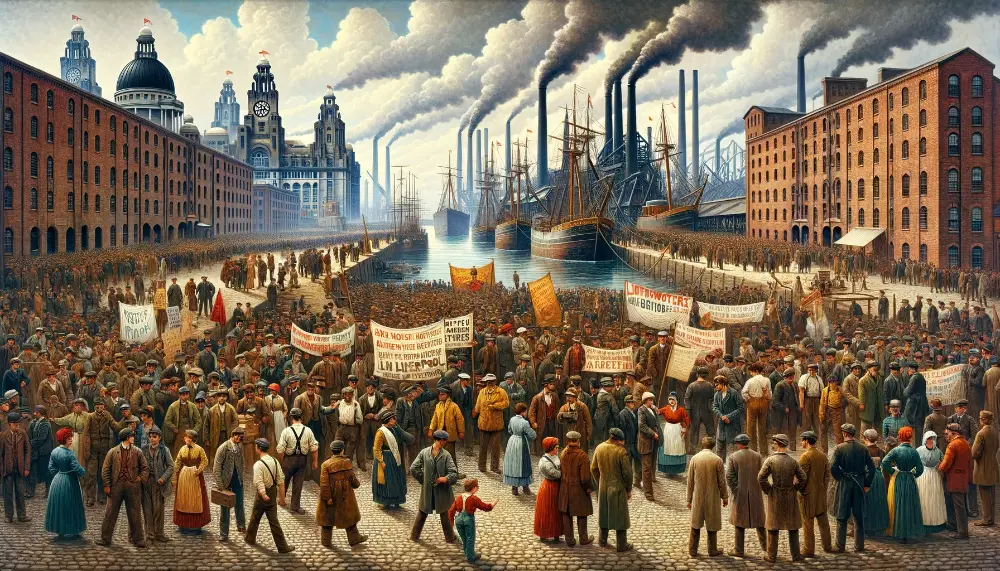
During the Industrial Revolution, Liverpool witnessed significant labour movements and social reform that shaped the city’s history. The emergence of trade unions and political labour movements was a direct response to the challenging industrial conditions faced by workers. These movements played a crucial role in advocating for better working conditions, higher wages, and improved rights for the labour force.
Key Takeaways:
- Liverpool experienced labour movements and social reform during the Industrial Revolution.
- The labour movements in Liverpool emerged as a response to challenging industrial conditions.
- Trade unions and political labour movements advocated for better working conditions and improved rights for workers.
- Key figures and events, such as the Liverpool Dockers’ Strike and James Sexton, played significant roles in Liverpool’s labour history.
- The labour movements had a profound impact on Liverpool’s industrial reform, improving the lives of workers and shaping the city’s social and economic landscape.
The Emergence of Labour Movements in Liverpool
The labour movements in Liverpool developed as a response to the industrial capitalism of the late 18th and early 19th centuries. The shift from traditional, labour-intensive farming and handicrafts to capital-intensive manufacturing led to a decline in real wages and living standards for workers in urban areas. This prompted the formation of trade unions and other labour organizations to advocate for better working conditions and treatment from employers and the government.
The harsh industrial conditions in Liverpool left workers struggling to make ends meet. Many faced long working hours, dangerous working environments, and meager pay. As a result, workers began to unite and organize themselves to address these injustices.
“The trade unions were seen as a vehicle of protection for the labouring classes,” explains historian Mark Latham. “They fought for workers’ rights, better wages, and improved working conditions, aiming to restore a sense of dignity and fairness in the industrial landscape of Liverpool.”
During this period, notable labour leaders such as James Sexton and John Highton emerged in Liverpool. Sexton, a trade unionist and politician, tirelessly campaigned for workers’ rights and social reform. Highton, a prominent figure in the labour movement, played a vital role in organizing strikes and protests to improve working conditions.
The labour movements in Liverpool faced significant opposition from employers and the authorities. Nonetheless, their relentless pursuit of social justice and fair treatment for workers gradually led to the recognition of trade unions and improvements in labour laws.
Impact of Labour Movements on Liverpool’s Industrial Conditions
| Benefits for Workers | Key Events | Improvements in Workplaces |
|---|---|---|
| Higher wages and shorter working hours | 1889 Liverpool Dockers’ Strike | Safer working conditions and sanitation standards |
| Improved job security and protection against arbitrary dismissals | 1907 Transport Strike | Restriction on child labour and implementation of minimum age requirements |
| Access to benefits such as sick pay and pensions | 1911 Liverpool General Transport Strike | Promotion of workers’ rights and fair labour practices |
Through their collective effort, the labour movements pressed for vital changes, resulting in improved industrial conditions and a more equitable society. They fought tirelessly to establish the rights and protections that workers enjoy today.
Key Figures and Events in Liverpool’s Labour History
In Liverpool, numerous key figures and events have played a crucial role in shaping the labour movement and social reform. These individuals and milestones have left a lasting impact on Liverpool’s labour history and the rights of workers.
One prominent event that stands out is the Liverpool Dockers’ Strike in 1889. Thousands of dockworkers took a stand against unfair working conditions and low wages, demanding better treatment from their employers. Their unified protest resulted in improved working conditions and recognition for trade unions, marking a significant milestone in Liverpool’s labour history.
“The Liverpool Dockers’ Strike was a turning point in our struggle for fair treatment and improved working conditions,” said Thomas Burns, a dockworker and leader during the strike.
“We were determined to challenge the unjust practices of the time and fight for the rights of all workers, not just in Liverpool but across the country.”
Another key figure in Liverpool’s labour history is James Sexton, a dedicated trade unionist and influential politician. Sexton tirelessly campaigned for workers’ rights and social reform, advocating for fair wages, shorter working hours, and improved living conditions. His relentless efforts paved the way for significant changes in Liverpool’s labour landscape.
“James Sexton was a true champion for workers’ rights,” remarked Sarah Thompson, a historian specializing in Liverpool labour history.
“His unwavering determination and commitment to social reform have left an indelible mark on Liverpool’s labour movement and the rights of workers.”
| Key Figures | Events |
|---|---|
| Thomas Burns | Liverpool Dockers’ Strike (1889) |
| James Sexton | Advocacy for workers’ rights and social reform |
Impact of Labour Movements on Liverpool Industrial Reform
The labour movements in Liverpool had a profound impact on industrial reform in the city. Through collective organization and advocacy, trade unions were able to secure better working conditions, higher wages, and improved rights for workers.
These labour movements played a crucial role in challenging the exploitative practices that were prevalent during the Industrial Revolution. By standing together and demanding change, workers were able to achieve significant improvements in their lives.
| Impact of Labour Movements | Description |
|---|---|
| Improved working conditions | Trade unions fought for safer and healthier workplaces, leading to reduced accidents and health hazards for workers. |
| Higher wages | Through collective bargaining and strikes, workers were able to secure better pay, allowing them to support themselves and their families. |
| Improved rights | Labour movements advocated for the recognition of workers’ rights, such as the right to form unions and engage in collective action. |
Thanks to the efforts of these labour movements, the working class in Liverpool began to see significant improvements in their quality of life. The impact reverberated throughout the city, leading to a shift in power dynamics and a recognition of the importance of workers’ rights.
Conclusion
The labour movements and social reform in Liverpool during the Industrial Revolution played a pivotal role in advocating for the rights and wellbeing of workers. Through their concerted efforts, significant progress was achieved in improving working conditions, securing fair wages, and enhancing the overall quality of life for the people of Liverpool.
The legacy of these labour movements continues to shape the social and economic landscape of the city today. The struggles faced by workers in Liverpool prompted the emergence of trade unions and other labour organizations, which fought tirelessly to challenge exploitative practices and secure better rights for workers.
Thanks to the labour movements’ dedication, Liverpool experienced tangible improvements in its industrial reform. The collective organization and advocacy of trade unions resulted in better working conditions, higher wages, and improved rights for workers. The labour movements in Liverpool played a crucial role in ushering in a more equitable society during a time of rapid change and industrial development.
In conclusion, the labour movements and social reform in Liverpool during the Industrial Revolution stand as testament to the power of collective action and the determination to fight for workers’ rights. Their impact is still felt in Liverpool today, shaping the city’s commitment to social justice and providing a blueprint for future movements seeking to bring about positive change in labour conditions.
FAQ
What caused the emergence of labour movements in Liverpool during the Industrial Revolution?
The labour movements in Liverpool developed as a response to the industrial capitalism of the late 18th and early 19th centuries. The shift from traditional, labour-intensive farming and handicrafts to capital-intensive manufacturing led to a decline in real wages and living standards for workers in urban areas. This prompted the formation of trade unions and other labour organizations to advocate for better working conditions and treatment from employers and the government.
How did key figures and events contribute to the labour movements in Liverpool?
Several key figures and events played a significant role in shaping the labour movement and social reform in Liverpool. For example, the Liverpool Dockers’ Strike in 1889 saw thousands of dockworkers protest against unfair working conditions and low wages. The strike ultimately led to improved working conditions and the recognition of trade unions. Another important figure in Liverpool’s labour history is James Sexton, a trade unionist and politician who championed workers’ rights and social reform.
What was the impact of labour movements on industrial reform in Liverpool?
The labour movements in Liverpool had a profound impact on industrial reform in the city. Through collective organization and advocacy, trade unions were able to secure better working conditions, higher wages, and improved rights for workers. They played a crucial role in challenging the exploitative practices that were prevalent during the Industrial Revolution and contributed to the overall improvement of living and working conditions in Liverpool.
What were the achievements of the labour movements in Liverpool?
The labour movements in Liverpool were successful in advocating for the rights and wellbeing of workers. They achieved significant progress in improving working conditions, wages, and overall quality of life for the people of Liverpool. Their efforts led to the recognition of trade unions, better working conditions, and improved rights for workers, subsequently shaping the social and economic landscape of the city.
Source Links
- https://en.wikipedia.org/wiki/Labour_movement
- https://webpages.cs.luc.edu/~dennis/106/106-Bkgr/20-Industrial-Rev.pdf
- https://www.encyclopedia.com/history/encyclopedias-almanacs-transcripts-and-maps/social-and-political-impact-first-phase-industrial-revolution
- The History Behind Liverpool’s You’ll Never Walk Along - February 16, 2024
- The History of Everton FC - February 16, 2024
- The History of Liverpool FC - February 16, 2024

